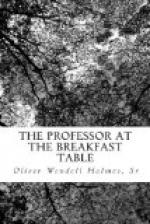—Little Miss Iris could not be said to begin life with a very brilliant rainbow over her, in a worldly point of view. A limited wardrobe of man’s attire, such as poor tutors wear,—a few good books, principally classics,—a print or two, and a plaster model of the Pantheon, with some pieces of furniture which had seen service,—these, and a child’s heart full of tearful recollections and strange doubts and questions, alternating with the cheap pleasures which are the anodynes of childish grief; such were the treasures she inherited.—No,—I forgot. With that kindly sentiment which all of us feel for old men’s first children,—frost-flowers of the early winter season, the old tutor’s students had remembered him at a time when he was laughing and crying with his new parental emotions, and running to the side of the plain crib in which his alter egg, as he used to say, was swinging, to hang over the little heap of stirring clothes, from which looked the minute, red, downy, still, round face, with unfixed eyes and working lips,—in that unearthly gravity which has never yet been broken by a smile, and which gives to the earliest moon-year or two of an infant’s life the character of a first old age, to counterpoise that second childhood which there is one chance in a dozen it may reach by and by. The boys had remembered the old man and young father at that tender period of his hard, dry life. There came to him a fair, silver goblet, embossed with classical figures, and bearing on a shield the graver words, Ex dono pupillorum. The handle on its side showed what use the boys had meant it for; and a kind letter in it, written with the best of feeling, in the worst of Latin, pointed delicately to its destination. Out of this silver vessel, after a long, desperate, strangling cry, which marked her first great lesson in the realities of life, the child took the blue milk, such as poor tutors and their children get, tempered with water, and sweetened a little, so as to bring it nearer the standard established by the touching indulgence and partiality of Nature,—who had mingled an extra allowance of sugar in the blameless food of the child at its mother’s breast, as compared with that of its infant brothers and sisters of the bovine race.




